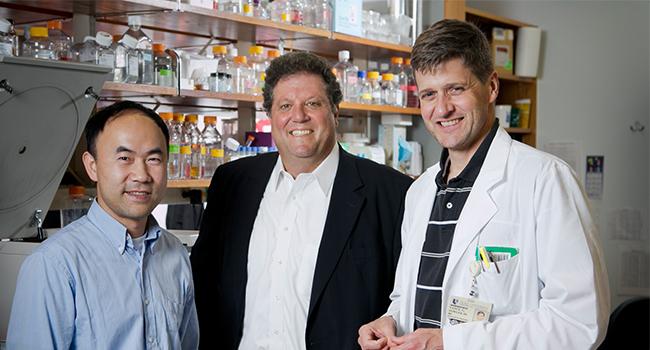
Vance Fowler, MD, MHS, professor of medicine (Infectious Diseases), is part of a research team funded by Duke Translational Medicine Institute and the Duke CTSA that is exploring the efficacy of beating back multidrug resistant bacteria by using chemical compounds known as LpxC inhibitors. These chemical compounds disrupt the formation of Lipid A in the protective membranes around Gram negative bacteria - a novel way of destroying bacteria.
Fowler's collaborators are Pei Zhou, PhD, professor of biochemistry, and Eric Toone, PhD, professor of chemistry and biochemistry.
“LpxC inhibitors target a pathway that has never been exploited by current antibiotics,” Zhou said. “It should be very effective for multidrug resistant strains [of bacteria].”
“That’s one of the big hooks,” says Toone, who in addition to being a chemist is also Duke’s Vice Provost and Director of the Duke Innovation and Entrepreneurship Initiative. “The mechanisms that have allowed more and more pathogenic bacteria to outsmart us aren’t expected to help the bugs at all when it comes to treatment with LpxC inhibitors.”
Fowler, Zhou and Toone are now turning to drug-resistant, Gram-negative pathogens involved in ventilator-associated pneumonia (VAP).
As the three investigators explain in their proposal for that collaborative funding, VAP caused by multidrug resistant bugs creates long odds for patient survival. They will test the use of three of their candidate compounds against a short list of the most troublesome multidrug resistant pathogens in VAP.
“One of the key aspects of this grant-funded work is to better understand the efficacy of the compounds we’ve made,” Toone said. “We’ve made more than 200 compounds grouped broadly into four classes. What we’d like to do is get a better sense of their efficacy not just against laboratory strains of bacteria, but against actual clinical isolates.”
The DTRI funding is serving a critical role in moving their work from the lab to the clinic. The team, including Zhou, Toone, and Fowler, is one of five to recently receive collaborative grants from the DTRI.
“The reason we are excited about the prospect of this agent being able to treat infections in a variety of settings including pneumonia is because we need alternatives,” Fowler said. “Doctors using antibiotics are like carpenters using tools. A carpenter with one hammer and no other tools won’t be very effective. The same analogy applies with doctors.
“If you have a new class of antibiotic with a new mechanism of action that’s totally different from before, the likelihood that bacteria will be resistant is much less. That’s what really makes this exciting.”